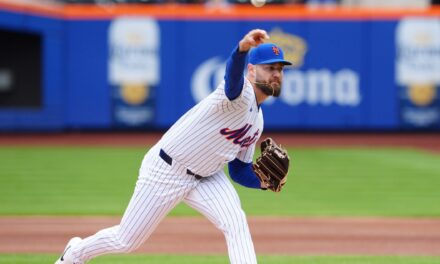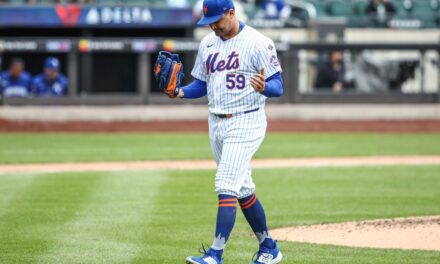
Dick Selma was probably considered the Mets’ top pitching prospect from the day he signed a $20,000 bonus contract in early 1963. The small (5’11, 160 lbs.) but hard-throwing righthander out of Fresno, California was assigned to Salinas of the California League in 1963 where he led the league in strikeouts and ERA and was named the league’s top rookie and best pitching prospect.
Selma was expected to be the future ace of the staff and after a couple of so-so years in the higher minors, burst onto the major league scene in 1965 with a shutout over the Braves in his second major league start in which he struck out 13, then a Mets record. His fastball was always impressive but his control was inconsistent and his stamina was questionable so the Mets never could quite decide whether he’d be better as a starter or reliever.
In 1968, he got off to a 6-0 start then slumped to finish at 9-10 but with an impressive ERA of 2.75 with 3 shutouts. The Mets decided to put Selma into the expansion draft where he was chosen by the Padres for whom he was the Opening Day starter and winner in 1969. By then, the Mets had Seaver, Koosman, Gentry, and Ryan with Les Rohr and Jon Matlack among their top pitching prospects, so you could say the loss of Selma wasn’t significant. Still, there were probably players the Mets protected that would never achieve what Selma already had and would continue to do at the major league level.
Later in 1969, the Padres traded Selma to the Cubs where he again both started and relieved and also took on the role of unofficial bullpen cheerleader and general rabble-rouser for the Cubs’ faithful. In ‘69, of course, this made him a prime enemy of the Mets and their fans, but we all know how that turned out, so there were few hard feelings toward Selma once the season ended. That winter, Selma was on the move again, going to the Phillies in a deal for Johnny Callison. Selma had 22 saves for the Phillies in 1970, but it was all downhill for him after that.
So, you could say Selma had a decent major league career, maybe not what you would expect from a so-called premium prospect, but still better than many. An interesting footnote about Selma is that he was one year ahead of Tom Seaver both in High School and at Fresno City College. Selma was unquestionably regarded as the better prospect although Dick liked and respected Tom and supposedly put in a good word for him when the Mets were considering putting their name in the special lottery for Seaver. I find it hard to believe that Mets’ management would have given much weight to Dick’s recommendation if they weren’t already going to make a play for Seaver, but we can add it to Selma’s positive resume as a Met.
Dick Selma passed away on August 29, 2001.















